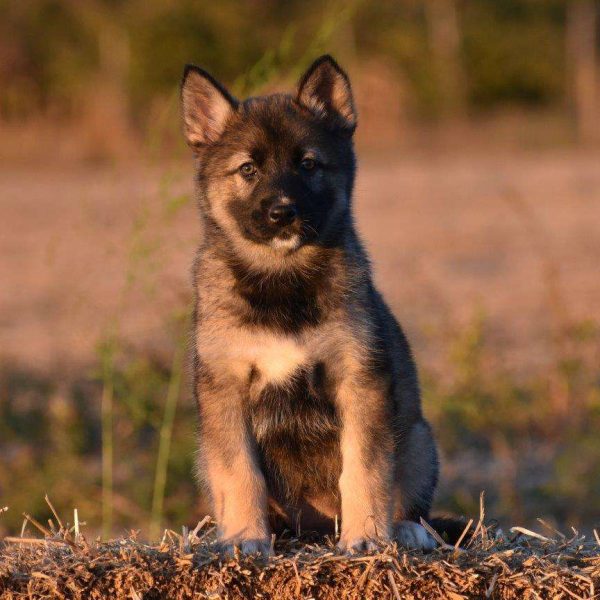
-
Activity Level:
high
-
Shedding Level:
moderate
-
Grooming Level:
moderate
-
Trainability:
high
-
Good for Novice Owners:
moderate
-
Adaptability:
moderate
-
Kid/Pet Friendly:
often
-
Prey Drive:
high
-
Watchdog:
very alert
- Average Size: Large
- Average Lifespan: 10-14 years
- Registered?: other
Shepsky Dog Breed Information
Overview
Temperament
Adaptability
Health
Owner Experience
Grooming
Activity Level
Size
Life Span
Did You Know?
A Shepsky, or a Gerberian Shepsky, is a cross between a German Shepherd and a Siberian Husky. As long as they are properly socialized, these dogs tend to be social, loyal, alert, intelligent, and affectionate dogs.
Because this is a newer hybrid breed, it is not currently recognized by the AKC, but it is recognized by other dog registries. The American Canine Hybrid Club and Dog Registry of America recognize the Shepsky.
Shepskies are affectionate and loyal family dogs that get along well with just about everyone as long as they are well-socialized and trained. They tend to do well with children and other dogs. Their high prey drive requires more socialization and training with other smaller pets in the household.
They tend to do well with smaller pets that have been raised with, but their high prey drive could be a challenge when integrating smaller pets later. Although these dogs can be protective of their families, they are generally open to meeting strangers and warm up once introduced as long as they have been properly socialized.
A Gerberian Shepsky will tend to bark to alert you. If you do not train your dog to stop barking, this behavior can become a nuisance. Even if you do manage your Shepsky’s barking, it’s important to note that they are still likely to be vocal dogs like their Siberian Husky parent, especially if you encourage it when they are a puppy.
A Shepsky is a moderately adaptable dog. They are generally better suited to larger homes with fenced yards where they can run. However, if you dedicate plenty of time to daily exercise and mental stimulation, they can adapt to apartment living.
With an arctic breed in the mix, Shepskies are sensitive to heat, but handle cold relatively well. They are one of the dog breeds that love winter so you may have trouble getting them to come back inside when they would rather lie around or play in the snow. Because they bond closely with their families and get bored easily, they don’t like to be left alone for long periods of time.
Although mixed-breed dogs can sometimes be healthier than purebred dogs, it’s not a guarantee and good breeding practices make a big difference. Potential health concerns to be aware of include hip dysplasia, elbow dysplasia, epilepsy, and progressive retinal atrophy.
Reputable breeders will screen their dogs to avoid passing issues to puppies. Make sure you ask the breeder about their breeding practices, the health history of the parents, and any tests or clearances that have been done.
As a large, barrel-chested breed, the Shepsky is at risk of bloat like its parents. Because bloat in dogs is dangerous, it’s important to know how to reduce the risk and to know the symptoms so you can get help as quickly as possible.
Gerberian Shepskies are highly trainable dogs that can be a good fit for owners of all experience levels. They are highly intelligent and pick up on things quickly, but they also have a lot of energy and get bored easily. These can be challenges for first-time dog owners to handle alone, so puppy training classes are encouraged.
Shepskies usually have a thick, fluffy double coat that can range from short to long. They will shed year-round and heavier as the seasons change. You can probably get away with brushing a few times a week, but daily brushing is ideal for keeping your dog more comfortable and their loose fur contained to grooming brushes, especially during seasonal shedding. Bathing is on an occasional as-needed basis,
In addition to coat care, you will also need to take care of your Gerberian Shepsky’s nails, ears, and teeth. Nail care, whether it’s clipping, trimming, or grinding, once or twice a month keeps nails from growing too long and causing issues. Weekly ear checks and carefully cleaning your dog’s ears as needed can help prevent ear infections.
Good dental care for dogs early and throughout your dog’s life is essential for preventing painful dental diseases and the other health issues they can cause later in life. Daily brushing or tooth cleaning in addition to cleanings at the vet when needed is an ideal start.
Shepskies are high-energy dogs and you will likely run out of energy before they do. Daily walks plus playtime, time to run, and extra activities are usually enough to keep them happy and healthy, but they will likely be up for more if you are.
Thankfully, they are versatile and athletic dogs. So, once puppies finish growing, you can try a range of higher-impact activities like playing frisbee, running, hiking, or even training for dog sports.
Fully-grown Shepskies usually stand 20-25 inches tall at the shoulder and weigh 45-90 pounds.
Gerberian Shepherds generally live for 10-14 years.
In addition to Shepsky or Gerberian Shepsky, this dog breed is also sometimes called a Husky Shepherd or Siberian Shepherd.






